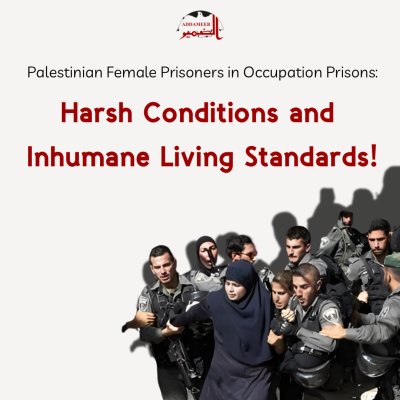
Ramallah – Addameer: Amid an unprecedented escalation in Israeli aggression against the Palestinian people and an ongoing campaign of genocide persisting for over a year, Israeli occupation authorities continue to enforce systematic repressive policies against Palestinians wherever they are. The occupation forces have been conducting the largest and most extensive arrest campaigns in decades, detaining tens of thousands of Palestinian citizens. In addition to this intense crackdown, prisoners in Israeli occupation prisons face brutal treatment, including the denial of basic human rights, repressive policies such as torture, deprivation of fundamental rights, and slow death.
Currently, the Palestinian prisoner movement within Israeli prisons is experiencing one of its most challenging and complex phases, with all achievements won over decades of struggle having been stripped away. Occupation authorities, at all levels, have been implementing collective punishment and slow death tactics against both male and female prisoners for over a year. These policies have led to the deaths of over 41 prisoners whose identities are known and tens more that remain unknown in Israeli prisons, alongside numerous other prisoner fatalities from Gaza detainees held in various camps and prisons.
Palestinian women have not been spared from this assault by the occupation against the Palestinian people. Since October 7, the occupation forces have detained over 430 Palestinian women. Currently, 94 Palestinian female prisoners remain in detention, among them elderly and ill prisoners. Approximately 30 of these women are held under arbitrary administrative detention—without charge—and 24 of them are suffering from various illnesses, including two who were injured by occupation gunfire.
The Deteriorating Health Situation of Female Prisoners
Many Palestinian female prisoners suffer from health issues due to being held in harsh conditions or as a result of injuries sustained before their detention or upon their arrest. Their treatment is deliberately neglected, and the Israeli authorities refuse to provide the necessary medical care for prisoners suffering from injuries or chronic illnesses, leading to a deterioration in their health. Often, treatment is delayed, or prisoners are denied access to essential medications, and they are often delayed in being transferred to medical clinics. This reflects the Israeli occupation's policy of denying detainees their basic health rights. It is worth noting that in recent months, the occupation has arrested several pregnant prisoners without regard for the risks posed to the lives of both the mother and the fetus due to the harsh conditions in the prisons. Additionally, since October 7, the occupation has significantly reduced personal hygiene supplies and provided only the bare minimum.
Solitary Confinement of Female Prisoners in the Occupations Jails:
Administrative detainee Khalida Jarrar as an example of Arbitrary Isolation Policy.
The Israeli occupation authorities continue to implement the policy of solitary confinement against Palestinian prisoners, both men and women, as an additional tool for tormenting them and as part of a collective punishment strategy aimed at breaking their will. One of the most prominent cases is that of former parliamentarian Khalida Jarrar, who was arbitrarily placed in solitary confinement in the Ramla prison, where she is held under harsh conditions that lack the most basic elements of human life, amid deliberate medical neglect by the prison administration. Khalida Jarrar has been arrested multiple times and spent long periods in prison, losing her daughter during a previous detention without being allowed properly mourn. Her isolation in a solitary cell is part of the occupation's policy targeting Palestinian women across all age and social categories. It is worth noting that the Israeli authorities recently extended Jarrar’s solitary confinement for an additional month, disregarding the consequences of such a decision, despite her suffering from multiple health issues that require medical care.
The harsh conditions in Damon Prison
The Israeli occupation authorities continue to detain female prisoners under harsh and inhumane conditions in Damon Prison, which is designated for women. The cells and rooms lack the basic necessities for humane living. They are cramped and overcrowded, with poor ventilation, making it difficult to live in such conditions. Additionally, the female prisoners suffer from food shortages and the lack of healthy, balanced nutrition, which negatively impacts their physical and mental health. Furthermore, the prisoners are forced to undergo humiliating and continuous searches, including thorough body searches. Recently, the Israeli authorities provided the prisoners with only one set of winter clothing while confiscating their summer clothes. It is also noted that the authorities have reduced the time for recreational time “Fora" and showering. In recent weeks, they have also started turning off the lights in all the rooms from 10 PM to 6 AM. These harsh conditions are part of the ongoing policy of targeting female prisoners and the collective punishment against all segments of the Palestinian population.
The female prisoners are being deprived of visits and communication with the outside world
Among the repressive policies that the Israeli authorities continue to implement against female prisoners is the prohibition of family visits for more than a year, depriving them of the ability to embrace and meet their children, which exacerbates their psychological and emotional suffering. Additionally, obstacles are placed in the way of lawyers visiting the female prisoners and detainees. The women are isolated from their families and the outside world, especially given the continued complete ban on visits by the International Committee of the Red Cross for over a year.